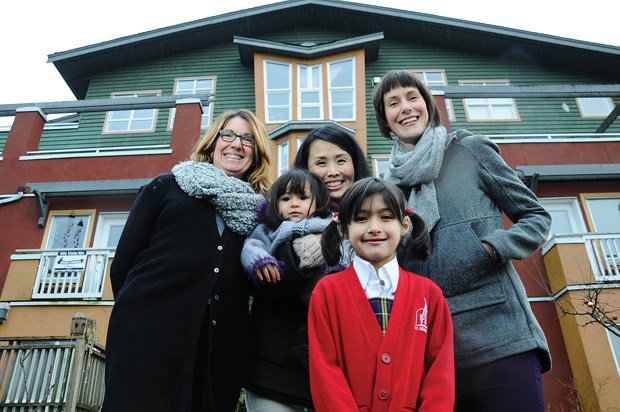Mackenzie Stonehocker and her family are searching for some liked-minded neighbours.
She’s currently renting a home in East Vancouver but she’s started a co-housing group that’s seeking to build a sustainable project in North Vancouver for up to 30 households.
Her group, Driftwood Village Cohousing, began informally in December 2014, after Stonehocker and her husband got together some friends and acquaintances to discuss the alternative housing idea after learning about a similar project in East Vancouver that was already full.
“The concept of co-housing, of having that connection with your neighbours, really resonated with us,” she said.
The group has chosen North Vancouver for their co-housing community.
“Just to be closer to nature and at the edge of all these people,” she said.
Already 15 households have signed up. It’s a diverse multi-generational group that ranges from young families like the Stonehockers, who have two small children, to retirees and everything in between.
So what’s co-housing? It began in the 1970s in Denmark and is essentially when a group of people get together to buy a piece of land and design and plan a complex that suits their needs.
Stonehocker, who has a master’s degree in environmental design and experience working for the City of Vancouver as a planner in the rezoning department, said co-housing units are just like typical condos or townhomes, and the cost of ownership almost the same.
Ownership is through strata and co-housing developments offer shared amenities, such as a guest suite and common room with large kitchen and dining area that can be used for special occasions and children’s play areas.
Although the development is planned to create a sense of community and sharing – a garden, tools and bike workshop, for instance – the units are also designed to give owners privacy.
“People who are introverted people really like it because you have the support network and these friends and neighbours who are nearby but the way that it’s designed, privacy is really well respected. There are spaces that are shared spaces and there are spaces that are private.”
While one of the main principles of co-housing is living in a community where you know and care about your neighbours there are other practical benefits.
“I think there’s the practical benefits of being able to share things like gardening tools or having a bike workshop and having that space used by a larger number of people. And there’s also the more social benefits of having the opportunities to socialize with people who are right there. … And you have also that connection and support network built right in. If a kid has to come home sick from school then somebody is likely around for an hour until the parent comes home,” said Stonehocker.
When researching co-housing communities, Driftwood Village met with members of Quayside Village, in the City of North Vancouver, which began in 1998. They were also invited to a potluck dinner at a co-housing project in Burnaby.
She said Driftwood is currently working on a feasibility study with consultants to get a better sense of the cost of building the co-housing community. “The next step is to find land,” she said, noting that there are various options, from assembling lots to a joint venture with developer or even leased land from the municipality.
Stonehocker said she is excited to “work on building a little piece of community-ville.”
Driftwood Village Cohousing is hosting an information session on Jan. 30, from 1 to 4 p.m. at the Anchor Room at the John Braithwaite Community Centre (145 First St. West), in North Vancouver. For more info: driftwoodvillagecohousing.com



